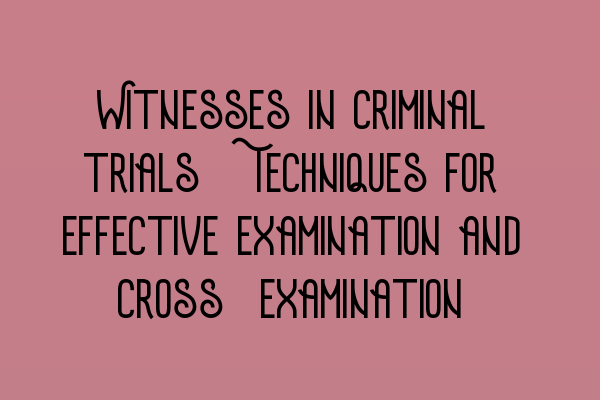Witnesses in Criminal Trials: Techniques for Effective Examination and Cross-Examination
In criminal trials, witnesses play a crucial role in presenting evidence and establishing the truth. As a criminal law practitioner, it is essential to employ effective examination and cross-examination techniques to elicit the most reliable and relevant testimony from witnesses. In this article, we will explore some techniques that can help improve the effectiveness of examining witnesses in criminal trials.
1. Preparing for Examination
Effective examination starts with thorough preparation. Familiarize yourself with the case, understanding the nature of the crime, the witnesses involved, and the evidence at hand. Conduct research on past cases and legal precedents to strengthen your arguments and identify potential weaknesses in the opposing side’s narrative.
Prepare a detailed examination plan that outlines the key points you want to cover with each witness. This will help you stay organized and ensure you don’t miss any crucial information during the examination process.
Additionally, practice your examination techniques beforehand. By conducting mock examinations, you can identify any areas where you may need improvement and refine your questioning style to ensure clarity and effectiveness.
2. Building Rapport
Building rapport with witnesses is essential to create a comfortable and trusting environment. This can be achieved by treating the witness with respect and empathy during the examination process. Use active listening skills, maintain eye contact, and express genuine interest in their testimony. This approach encourages witnesses to feel more at ease and increases the likelihood of obtaining comprehensive and accurate information.
3. Open-Ended Questions
During examination, it is essential to use open-ended questions to allow witnesses to provide detailed responses. Open-ended questions encourage witnesses to share their personal experience without being limited by yes or no answers. This can reveal hidden details and offer a more complete picture of the events in question.
For example, instead of asking, “Did you see the defendant enter the building?”, ask, “Can you describe what you saw when the defendant entered the building?” This prompts the witness to provide a narrative, enabling you to gather more relevant information.
4. Structuring Cross-Examination
Cross-examination requires a strategic approach to challenge the credibility and consistency of witness testimony. Begin by summarizing the witness’s previous testimony to lay the groundwork for your questioning. Then proceed to ask pointed and focused questions designed to expose any inconsistencies, biases, or inaccuracies.
Remember to remain calm and composed during cross-examination. Avoid badgering or antagonizing the witness, as it can undermine your credibility and damage your case.
5. Addressing Difficult Witnesses
Not all witnesses will be cooperative or truthful. It is crucial to have strategies in place to handle difficult witnesses effectively. Remaining calm and confident is key. Use leading questions to guide the witness towards the desired answers without explicitly telling them what to say. If faced with hostile witnesses, focus on discrediting their testimony by highlighting inconsistencies and contradictions with the available evidence.
6. Adapting to Different Witnesses
Each witness may have a unique communication style and personality. It is essential to adapt your questioning techniques accordingly. Some witnesses may respond better to a more assertive approach, while others may require a more empathetic and supportive approach. By adapting your style to suit the witness’s individual needs, you can establish better communication and acquire more valuable information.
7. Conclusion
Effective examination and cross-examination of witnesses are vital skills for criminal law practitioners. By adequately preparing for examination, building rapport with witnesses, using open-ended questions, structuring cross-examination, addressing difficult witnesses, and adapting to different communication styles, you can improve your chances of obtaining reliable and relevant testimony.
For more information on preparing for the SQE exams, check out these related articles:
- SQE 1 Practice Exam Questions
- SQE 1 Practice Mocks FLK1 FLK2
- SQE 2 Preparation Courses
- SQE 1 Preparation Courses
- SRA SQE Exam Dates
